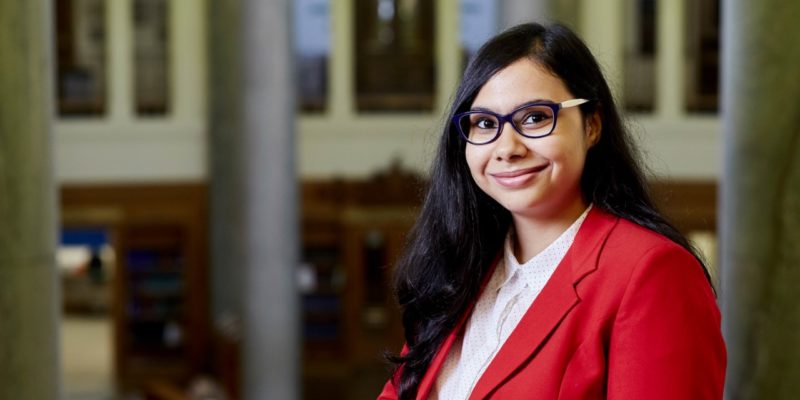Researcher of the Month - Sreya Datta

Please introduce yourself and tell us a little about your ‘research journey’. How did you get to where you are right now?
My name is Sreya Mallika Datta and I arrived in Leeds in October 2017 to start my PhD on community in African literature. I have recently submitted my thesis and am awaiting my viva. I hold undergraduate and MA degrees in English literature from Presidency University, Kolkata and the University of Delhi, respectively. It was towards the end of my MA that I began to develop a serious academic interest in African literature. As I began to tap into wider literary-critical readings of African literature, it struck me how many writings referred to the communal in African literature as a form of overarching “consciousness” or as a traditional worldview at odds with the individualism of modern existence. Yet, there were not many studies that questioned some of these formations and conceptual models of addressing community. The kernel of my research project emerged out of this problematic and I sent off a proposal to Dr Sam Durrant who agreed to supervise the thesis. With his support, I also received the full-time Bonamy Dobree Scholarship from the School of English which enabled me to carry out this research.
Who, or what, sparked your interest to work on your particular research area?
I have always been drawn towards the broad arena of Postcolonial studies and literatures, partly to do with my own upbringing and background. I can recall the moment my interests in African literature were first sparked: I had just finished reading Chinua Achebe’s A Man of the People (which was, incidentally, the first piece of African writing I encountered way back during my high school years!) and I remember feeling deeply moved by the lucidity of the prose and the complexity of the ideas in circulation. In a sense, I could also relate to the novel’s depictions of a postcolonial modernity that felt similar to the corruption of a political bureaucratic class in my own country. As I began to read more widely, I was intrigued by how, despite dealing with “heavy” themes such as political crises, war, development, and so on, the texts I read refused to be solely defined by alienation, repression, or isolation. I was eager to become a well-rounded student of African literature, to appraise how this dynamic perhaps cannot be neatly classed into binaries of the political versus the private, the collective versus the individual. That journey still continues.
What are you currently working on, and why do you think it’s important?
I have recently completed my doctoral thesis which traces the critical inheritance of community as a conceptual alternative in Nigerian literature. I examined the work of four writers: Amos Tutuola, Chinua Achebe, Chigozie Obioma, and Sefi Atta. In brief, my thesis assesses how African (and in my case, Nigerian) literature can be an avenue for theorising community beyond certain binaries such as that between tradition and modernity. I am interested how literature can act as an interface for exploring or imagining these alternative forms of community. More often than not, community is framed as an aspect of the past, as that which is lost in modernity or in the processes of change. African literature shows us, on the contrary, that questions of community have mediated change, have resisted the linear construction of temporality as fixed between the oppositions of tradition and modernity. I think this project is important because it forwards a non-oppositional approach, thereby remaining alive to the multiple ways in which literary texts articulate a collective imaginary without being necessarily restricted to the more conservative understandings of community as that which is closely tied to dogmatic tradition or authority. The project has tried to assess what notions of collective futures can be opened up if we follow this approach.
How does your research contribute to current debates in African (and African diaspora) studies as an interdisciplinary field?
In general, across disciplines in the Humanities and Social Sciences, there is a great momentum for devising conceptual strategies, methods, and frameworks that can build reciprocal, collaborative, and common futures. The idea of that which is in-common has become essential to the very question of human survival now. Taking inspiration from the words of the philosopher, the late Emmanuel Eze, the task of postcolonial writing is to “remake the past in the form of a promise.” In several conversations about the decolonial, or decolonisation, this aspect about reclaiming the past to secure a more just future has taken precedence. Shifting the tone slightly, I would suggest that decolonisation unworks the close coupling of modernity/coloniality by remaking the past, thereby redefining what “modernity” itself might come to signify. It signals a relationship with the past which is not shackled to viewing the past as a lost aspect of our present experience. I see my work as a drop in the ocean of such conversations, and I am particularly invested in how literary works can help us imagine such futures.
Is there anything you would like to add?
I became a member of the Leeds University Centre for African Studies (LUCAS) in my first year as a PhD candidate. Over the years, I have participated in LUCAS’s activities in several capacities, and it has contributed in manifold ways to my intellectual and professional development. Above all, I would like to use this space to acknowledge my debt to this Centre, which provides an equal platform for all who consider themselves to be students of African studies.
